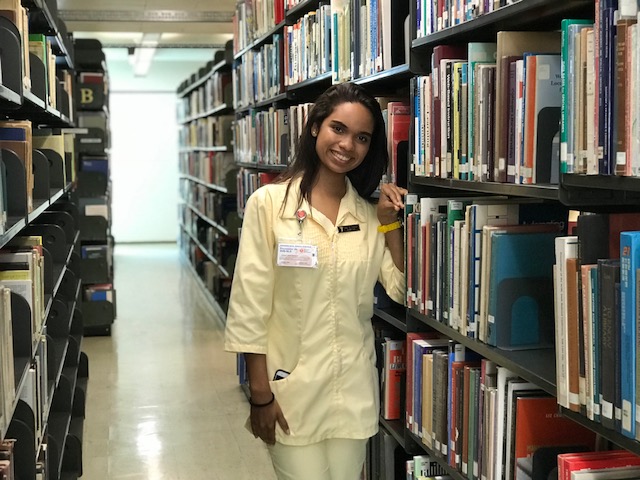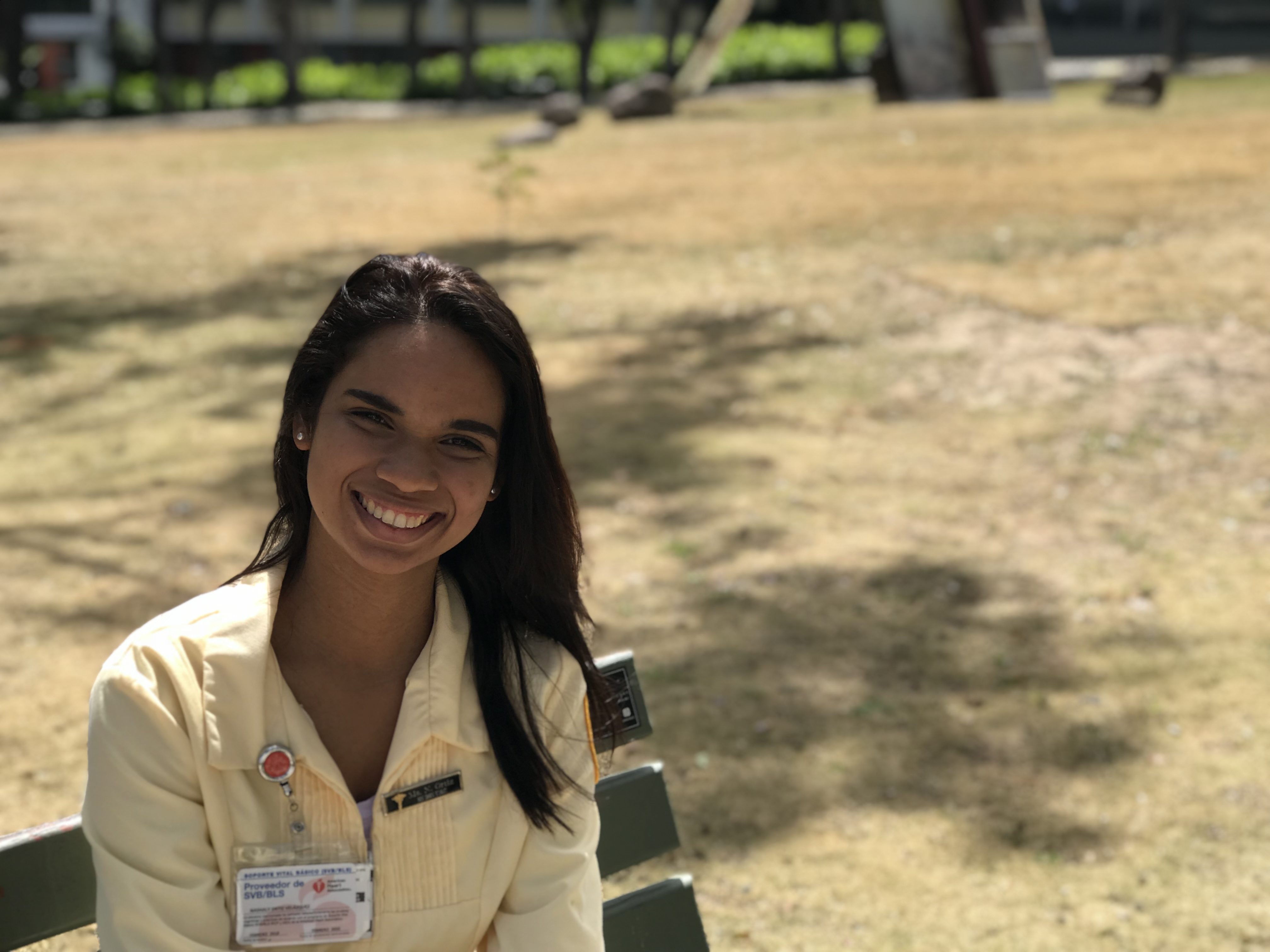“Now That I Live On My Own, I Have Spent Weeks with Just Ten Dollars in My Pocket”

Nashaly Ortiz in the library. Photo: Leynice Rivera
Leer en Español
Nashaly Ortiz, a 22-year-old student from Naguabo, a town in southeastern Puerto Rico, remembers the terrifying blow of Hurricane Maria like it was yesterday. The damage the hurricane caused, forced her to leave her family in order to finish her studies in nursing at Universidad del Sagrado Corazón (USC) in San Juan, PR. Her father migrated to the U.S mainland to look for better economic opportunities, and so she has taken on the responsibility of trying to find medical care for her mother who suffered a stroke just prior to the hurricane.
Ortiz says that the economic shift has been difficult — leaving a lifestyle where she had everything to one where she doesn’t have enough to eat. However she says this difficult situation has not prevented her from finishing her studies. On the contrary, the experience has motivated her to continue so she can help her family.
This conversation has been edited for clarity and length.
How did your life change after Hurricane Maria?
My life changed drastically. My family and I lost a lot of things in the house because of the amount of water that got in, like for example, our furniture. The structure of the house was also affected and on the nights we spent without power we would sleep in fear and we felt unsafe because of the crime rate. After the hurricane passed, the crime rate in Naguabo increased. During the night, we were worried because the lack of gasoline for our cars or power generators, meant that people were stealing gas by damaging cars. Moreover, they would take advantage of the dark to break into houses and steal.
Have you been without food?
There isn’t a lot of food at home. I have to save up as much as possible so I am able to contribute to my home expenses and [for] basic expenses. We still have not been able to recuperate what we lost. Now that I live on my own, I have spent weeks with just 10 dollars in my pocket.
How did the hurricane affect you emotionally?
A lot. My family’s situation affects me a lot. My mom had recently suffered a stroke that made her lose basic functions. Now my sisters and I are taking care of her, now that dad isn’t here.
Did you ever think about dropping out of university?
I have always been focused on finishing my studies and I am willing to make sacrifices.
Which sacrifices have you had to make?
Moving into the residences at the university, living far from my family and asking for a loan so I could pay my university bills and other personal expenses. I never thought I would go through something like this.
How has your academic life been affected?
The advantage of living alone and far from my family is that I can focus on studying and not think of all those problems.
Ahora que vivo sola, he pasado semanas con solo 10 dólares en el bolsillo”
Nashaly Ortiz, puertorriqueña de 22 años de edad residente del pueblo de Naguabo, recuerda como si fuera ayer el aterrador paso del huracán María sobre Puerto Rico.
La tragedia la llevó a sufrir la separación indefinida de su familia y a enfrentar muchas dificultades tratando de conseguir atención médica para su madre, quien sufrió un derrame cerebral poco antes del huracán. Su padre migró a Estados Unidos, para buscar una mejor situación económica. Y ella tuvo que tomar medidas extremas para poder poder culminar sus estudios en Enfermería en la Universidad del Sagrado Corazón (USC).
Ortiz cuenta que el cambio económico ha sido difícil — dejar a un lado un estilo de vida donde lo tenía todo, a no tener que comer. Sin embargo, dice que para ella esta difícil situación no ha sido un obstáculo para completar sus estudios. Al contrario, esta experiencia la ha motivado a continuar para así poder ayudar a su familia.
¿Cómo cambio tu vida después del huracán María?
Mi vida cambió drásticamente. Mi familia y yo perdimos muchas cosas de la casa por la cantidad de agua que entró, como por ejemplo, los muebles. La estructura de la casa se afectó y las noches que pasamos sin el servicio de energía eléctrica dormíamos con temor y nos sentíamos inseguros por la criminalidad. Luego del paso del huracán, la criminalidad del pueblo de Naguabo aumentó. Durante las noches, la desesperación por falta de gasolina para los automóviles o plantas eléctricas, provocó que intrusos robaran la gasolina dañando carros. Además, se aprovechaban de la oscuridad para entrar a propiedades y robar.
¿Han estado sin comida?
No hay mucha comida en casa. Tengo que ahorrar lo más posible para poder aportar a la economía de mi casa y [para] gastos básicos. Todavía no nos hemos podido recuperar, sino todo lo contrario. Ahora que vivo sola, he pasado semanas con solo 10 dólares en el bolsillo.
¿Cómo te afectó el huracán emocionalmente?
Un montón. Me afecta mucho la situación de mi familia. Mi mamá recientemente había sufrido un derrame cerebral que la hizo perder destrezas básicas. Ahora mis hermanas y yo tenemos que cuidarla, ya que papi no está.
¿Pensaste abandonar la universidad?
Siempre he estado centrada en terminar mis estudios y estoy dispuesta a hacer sacrificios.
¿Qué sacrificios has tenido que hacer?
Mudarme al hospedaje de mi universidad, vivir lejos de mi familia y pedir un préstamo para poder pagar la universidad y otros gastos personales. Nunca pensé que pasaría por algo como esto.
¿Cómo se afectó tu vida académica?
La ventaja de estar sola y lejos de mi familia es que puedo dedicarme a estudiar y no pensar en tantos problemas.
This story was written by Leynice Rivera.
This story was part of a collaboration between Feet in 2 Worlds and journalism students at Universidad del Sagrado Corazón in San Juan, Puerto Rico. Translated from the original Spanish by John Pink.
Fi2W is supported by the David and Katherine Moore Family Foundation, the Ralph E. Odgen Foundation, the J.M. Kaplan Fund, an anonymous donor and readers like you.


